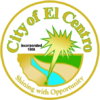El Centro
| El Centro, California | ||
|---|---|---|
| City | ||
| City of El Centro | ||

Imperial County Courthouse in El Centro
|
||
|
||
 Location in Imperial County and the state of California |
||
| Location in the United States | ||
| Coordinates: 32°48′N 115°34′W / 32.800°N 115.567°WCoordinates: 32°48′N 115°34′W / 32.800°N 115.567°W | ||
| Country | United States | |
| State | California | |
| County | Imperial | |
| Incorporated | April 16, 1908 | |
| Government | ||
| • Mayor | Alex Cardenas | |
| Area | ||
| • City | 11.099 sq mi (28.746 km2) | |
| • Land | 11.081 sq mi (28.700 km2) | |
| • Water | 0.018 sq mi (0.046 km2) 0.16% | |
| Elevation | -42 ft (-12 m) | |
| Population (2013) | ||
| • City | 44,124 | |
| • Density | 4,000/sq mi (1,500/km2) | |
| • Urban | 56,006 | |
| • Metro | 163,972 | |
| Time zone | Pacific (PST) (UTC-8) | |
| • Summer (DST) | PDT (UTC-7) | |
| ZIP codes | 92243-92244 | |
| Area codes | 442/760 | |
| FIPS code | 06-21782 | |
| GNIS feature IDs | 1656501, 2410409 | |
| Website | www |
|
El Centro is a city in and county seat of Imperial County, the largest city in the Imperial Valley, east anchor of the Southern California Border Region, and the core urban area and principal city of the El Centro metropolitan area which encompasses all of Imperial County. El Centro is also the largest American city to lie entirely below sea level (−42 feet or −13 meters). The city, located in the far southeastern corner of California, is near the major Southern California city of San Diego and the Mexican city of Mexicali.
Founded in 1906, W. F. Holt and C.A. Barker purchased the land on which El Centro was eventually built for about $40 per acre ($100 per hectare) and invested $100,000 in improvements. As one historian of valley life put it, "in only five months El Centro went from a barley field to a city...". It is home to retail, transportation, wholesale, and agricultural industries. There are also two international border crossings nearby for commercial and noncommercial vehicles. The city's population was 42,598 at the 2010 census, up from 37,835 in 2000.
Spanish explorer Melchor Díaz was one of the first Europeans to visit the area around El Centro and Imperial Valley in 1540. The explorer Juan Bautista de Anza also explored the area in 1776 (an elementary school in El Centro now bears his name). Years later, after the Mexican-American War, the northern half of the valley was annexed by the U.S., while the southern half remained under Mexican rule. Small scale settlement in natural aquifer areas occurred in the early 19th century (the present-day site of Mexicali), but most permanent settlement (Anglo Americans on the U.S. side, Mexicans on the other side) was after 1900.
...
Wikipedia



